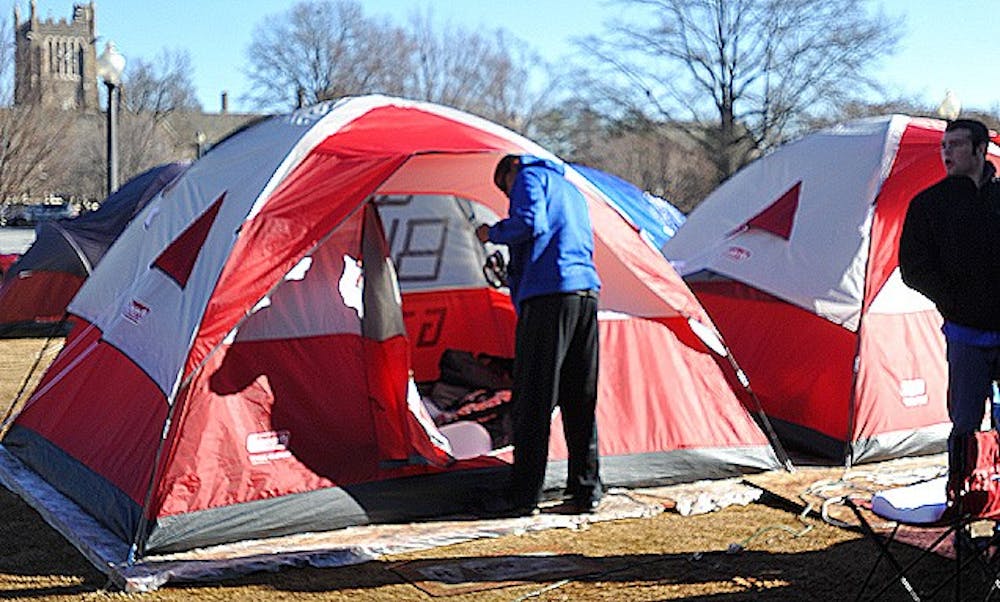The Tar Heels may face a notably healthier crowd of Cameron Crazies in Cameron Indoor Stadium Saturday, according to data from Duke Student Health.
Tenters camping in Krzyzewskiville have boasted resiliency to freezing cold nights this winter. Only 13 students who identified as tenters have been treated for illness at Student Health this year, according to numbers provided by Student Health Executive Director Dr. Bill Purdy. This figure has been on a downward trend in recent years—in 2010 and 2011, 49 and 28 identified tenters sought medical help from Student Health, respectively.
Purdy attributes this to the triangle’s milder winter compared to years past.
“In previous years, on the coldest days we’d go out and give hot chocolate to help keep people warm, and we’d send nurses out to K-ville to make sure students were healthy,” Purdy said. “We haven’t had to do that this year.”
The recent norovirus outbreak on campus has only brought a handful of tenters to Student Health, he added.
The 2012 tenting season has been considerably warmer than recent tenting seasons, according to data from weather forecasting service Weather Underground. The Durham average low temperatures for the 2010 and 2011 tenting seasons were approximately 31 and 30 degrees Fahrenheit, respectively. This year, the average low during tenting weeks has increased by about five degrees to 36 degrees Fahrenheit. Of the roughly 49 nights in K-ville this year, only 10 have dipped beneath freezing temperatures.
Despite a warmer winter, some tenters have fallen ill. Purdy said the nature of tenting is to blame for the typical K-ville illness—one he describes as “flu-like,” showing symptoms such as sore throat, fatigue, fever and congestion.
“Students are in close quarters,” he noted. “The weather is cold and sometimes wet, and tenters probably aren’t getting as much sleep as non-tenting students.”
Freshman Chris Williams said that all 12 students in his tent became sick a few days after he began his tenure as a black tenter. He attributes this to the confined conditions to which black tenters are subjected.
“During black tenting, we were out in the cold every single night, and we were all sleeping together in this tiny a— tent,” Williams said. “So as soon as one of us got sick, everybody else got sick. You’ve got sick people in the tent all the time, and the whole thing becomes this gross, illness-ridden container.”
None of the tent occupants sought treatment at Student Health, Williams noted.
To current and future tenters, Purdy said he prescribes the normal preventative measures.
“Eat well, get some exercise and dress appropriately in cold weather,” he said.
A healthy K-ville should provide the wildest and most energetic student section, said freshman Taylor Festa, a blue tenter who has so far stayed healthy.
“As miserable as tenting was for some, I’m glad we were able to fight through it,” Festa said. “With healthy Crazies, we’ll be able to send Carolina to hell, no problem.”
Get The Chronicle straight to your inbox
Signup for our weekly newsletter. Cancel at any time.

